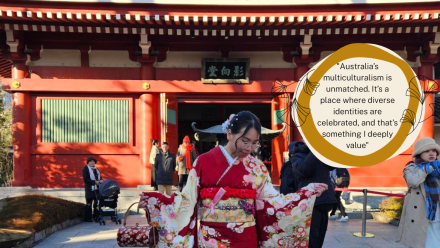Andrew Pike OAM
"I originally wanted to study film, so I did the closest I could do: English and History,” says Andrew Pike, now Managing Director of Ronin Films and founder of Electric Shadows Cinema.
"But really, my training and university experience was a product of not having continuous assessment and instead only end of year exams."
"I joined the ANU film group in the first year as an undergraduate - that would have been about 1964."
"At that stage, we were showing films at various venues around the University and we used to lug loaned projectors around campus."
"There was a wonderful man in tech services called Tom McMahon, Mr McMahon as we always called him with great respect, he was a was a terrific support for us."
"We were showing 16 millimetre prints of the films that we really liked – new feature films from the US and the UK – and also films we would borrow from the French or Czech Embassies."
"We’d preview things to make sure that they were ok to run, and then we’d get really excited about them, and run them once, and then again and again."
"And we’d get very big crowds there in the Physics Lecture Theatre, which was a primitive venue for film screenings, and then the Coombs Theatre, where we ended up showing most of the films."
"We were definitely running esoteric stuff."
"It was student-led, and basically, student supported, with only a little involvement from academic staff."
"We started actually making films towards the end of the 1960s. The Federal Government created an Experimental Film and TV Fund and a couple of us got small grants from that."
"We started making experimental films. And that activity was given great stimulus by the appointment of Arthur and Corinne Cantrill as Creative Arts Fellows in the late 1960s. They were film makers who were working outside the mainstream industry doing abstract, avant-garde films. Arthur was a great teacher who did a lot of weekend workshops, and we got very involved in the films that they were making in Canberra."
"We were doing all these things, and dedicating a huge amount of time to it, because we were not having continuous assessment. We only had end of year exams, so basically we were operating in a fairly protected environment pursuing film culture."
"But when it got to about two weeks before exam time, we’d all study like mad, and managed to get through. In fact, amazingly on that basis, I won a prize for Australian History. I have no understanding of how that happened!"
"With the films, with what ended up being my career, there was no forward plan, it was just seizing opportunities, and the Canadian films, for example, were a huge influence on us."
"They still form part of my cultural world, how I think about the arts and society. It was all formed through these experiences.”
Further reading:


